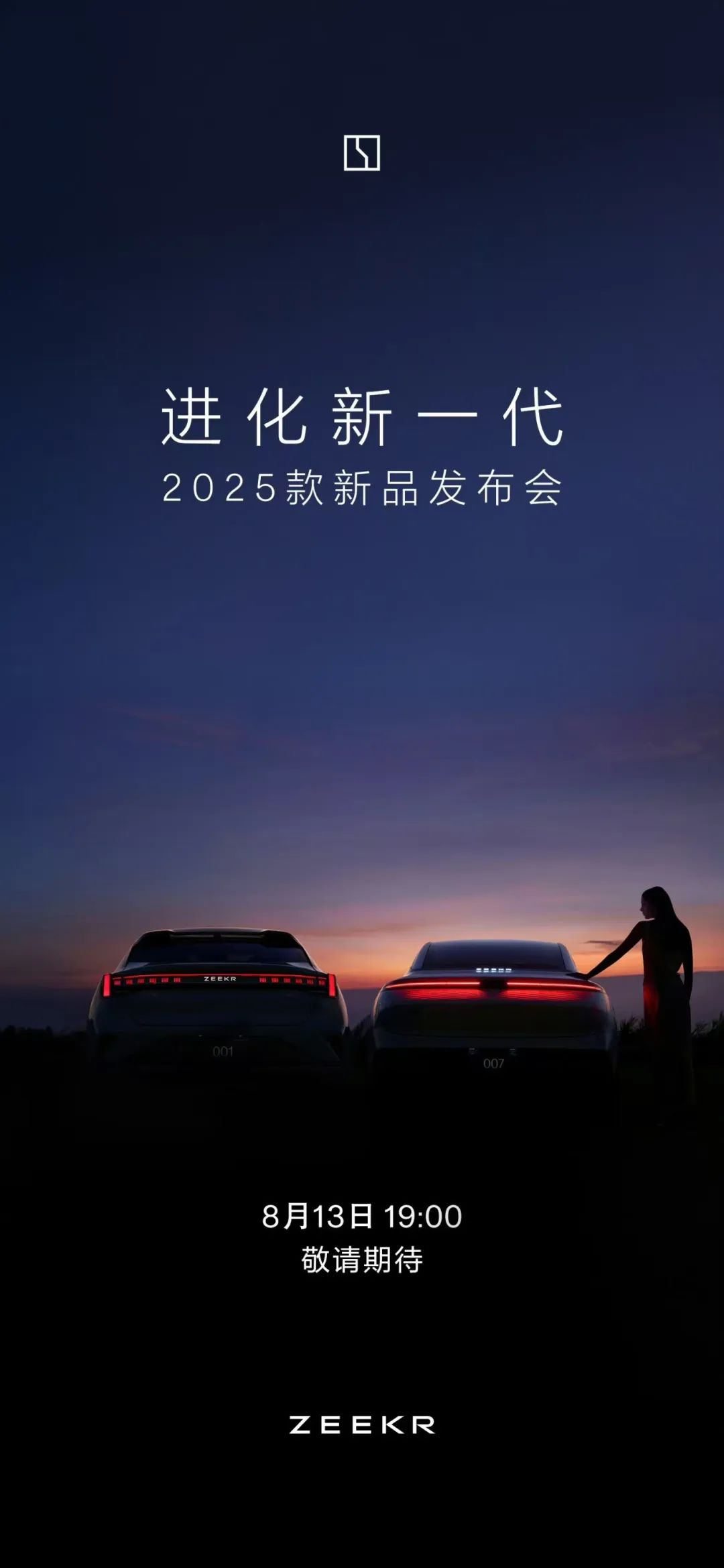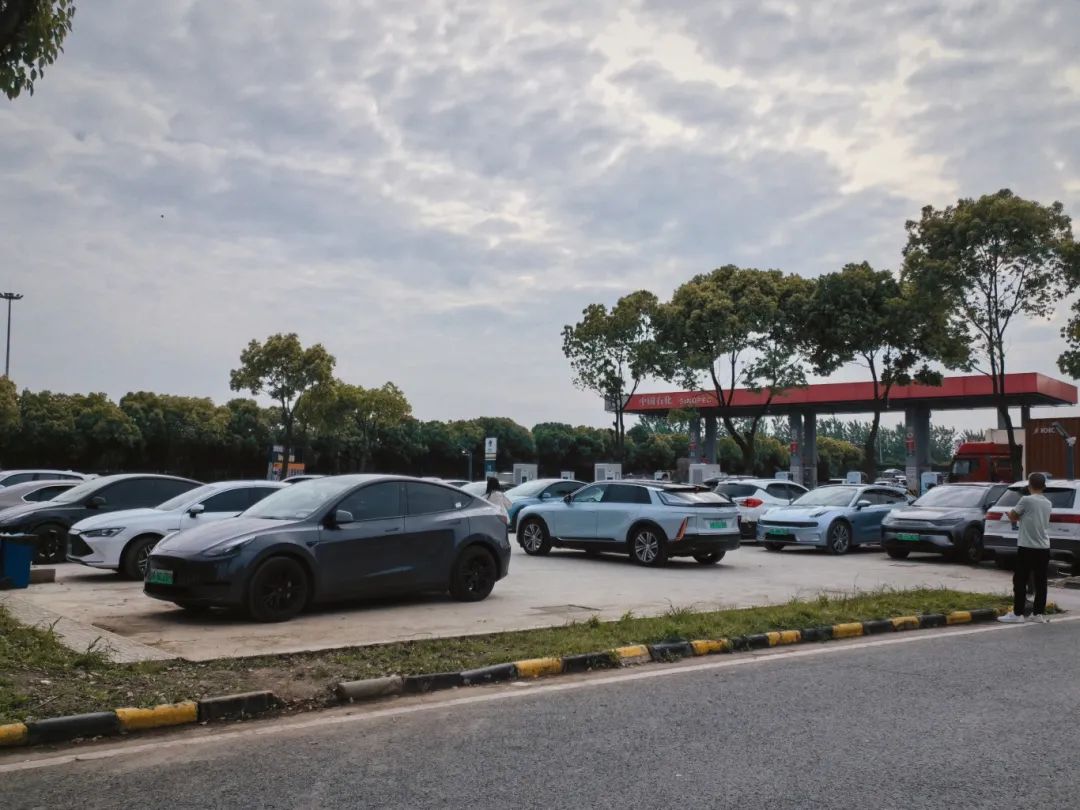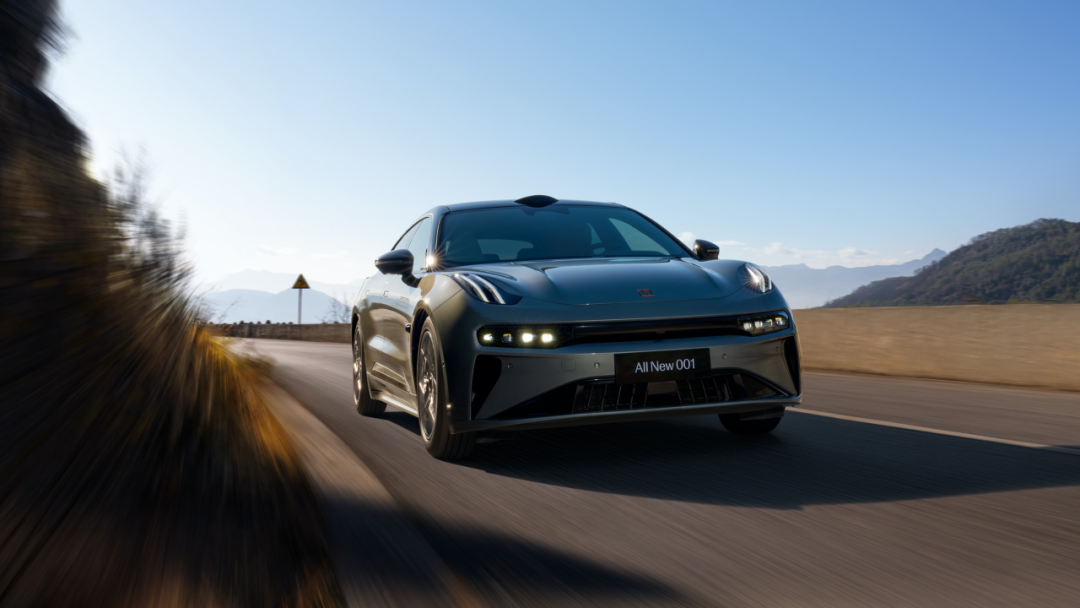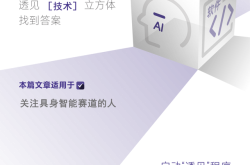Who would dare to buy an electric car with such tactics?
![]() 08/13 2024
08/13 2024
![]() 539
539

Introduction
Introduction
One recommendation, lose a friend, not worth it.
"Has Zeekr gone crazy?"
"It feels like the 001 just had a facelift not long ago, how come the 2025 model is already coming?"
"What's coming this time?"
"Is the intelligent driving system switching to in-house research and development?"

This is no fabrication. Last Sunday, while I was driving, I suddenly received a flurry of calls from a childhood friend. Due to the holiday, I hadn't been paying much attention to the automotive industry.
Therefore, I wasn't entirely sure what he was talking about.
Upon returning home, I opened Zeekr's official Weibo account and found an eye-catching poster that explained everything. In the center, the iconic taillights of the Zeekr 001 and Zeekr 007 stood out prominently, with the words "Evolving into the Next Generation, 2025 Model Launch Event" emblazoned above. The event was scheduled for 7:00 PM Beijing time on August 13th.
Honestly, even as an insider, I was surprised by this "surprise attack."
On the one hand, it feels like Zeekr's communication focus has been almost entirely on the new Zeekr 7X and Zeekr MIX models recently. On the other hand, take the current best-selling Zeekr 001 as an example; it underwent a widely praised upgrade in February of this year, and it was unexpected that another iteration would come just six months later.
"I'm looking forward to the launch event, I'm going all in."
Before I could even respond to the initial question, I quickly received my friend's statement, from which I could clearly sense his excitement and joy. After all, the Zeekr 001 has always been his "dream car." If some of its shortcomings can indeed be quickly addressed in the 2025 model, making a purchase will become a natural next step.
Certainly, similar cases are precisely what Zeekr would like to see, but I find myself lost in thought...
Truly Scared of "Domestic Electric Cars"
New generation batteries, new generation intelligent driving, new generation cockpit.
Just yesterday, Zeekr's official Weibo account once again teased the 2025 model launch event, scheduled for 7:00 PM Beijing time on August 13th, with three more eye-catching posters.
Looking back at the retail sales of this new force in automaking for the first seven months of this year:
12,537, 7,510, 13,012, 16,089, 18,616, 20,106, 15,665 units, roughly showing a continuous upward trend, but with inevitable fluctuations and bottlenecks. Looking at the current Zeekr 001 and Zeekr 007, they undoubtedly serve as the company's primary "sales pillars," especially the former.
Precisely based on this background, in order to continue making breakthroughs at the retail level and consolidate the industry position of its main models, Zeekr is left with no choice but to act swiftly.
It can be foreseen that Zeekr's such rapid pace will undoubtedly cause dissatisfaction and resentment among some long-time customers. The other significant challenge facing this new force in automaking is how to Soothing and soothing old customers while aggressively courting new ones.
Otherwise, it's quite possible that "the bowl may be filled, but the reputation shattered."
Whether the final result will be as Zeekr hopes, allowing the 2025 Zeekr 001 and Zeekr 007 to reach new heights in the fiercely competitive 200,000-300,000 yuan pure electric market, the answer will soon be revealed.
Shifting perspectives, I would like to share some of my thoughts or frustrations in the following paragraphs.
Having been in the automotive industry for over five years as a media professional, I inevitably get asked by many friends around me how to choose a car. In the era when traditional gasoline-powered cars dominated, I was more than willing to offer rational and objective advice and analysis based on everyone's needs, as the terminal prices and replacement cycles of almost all products were relatively stable at that time.

What to buy, how to buy, and when to buy are clear at a glance.
However, in the era of smart electric vehicles, I am increasingly reluctant to offer positive responses. It's already a voluntary favor, but even I'm not entirely sure when the fiercely competitive Chinese new energy OEMs will suddenly drop prices or introduce facelifts.
Often, after offering a so-called "recommendation" and based on a certain level of trust, the corresponding friend happens to spend real money, only to be severely "backstabbed" in the end. Who, then, should bear the responsibility?
Ultimately, due to the painful lessons that are still fresh in my mind, and with the attitude that it's better to have fewer things to worry about, my response has gradually become: "Don't ask me what electric car to buy."
Sometimes, if I can't avoid it, I'll blindly recommend Tesla.
After all, combined with the sincerity demonstrated by the "refreshed" Model 3 launched last year, Tesla's "nostalgic" product strength has always been the most reliable trait of this American new energy automaker. Moreover, whether it's the Model 3 or the Model Y, as their prices gradually "bottom out," it feels like there's not much left to shake up.
In other words, with the goal of making money, Tesla at least won't suddenly drop prices by tens of thousands of yuan while frantically increasing production without hesitation. Even if the above mental journey sounds somewhat ironic and satirical, I've been truly scared by the overly diligent and internally competitive "domestic electric cars" over the past two years.
One recommendation, lose a friend, not worth it.
This is a War Without Smoke
In July, according to the results released by the China Passenger Car Association (CPCA), new energy vehicles (NEVs) once again made history. Specifically, retail sales reached 878,000 units, representing a year-on-year increase of 36.9% and a month-on-month increase of 2.8%.

Correspondingly, the retail penetration rate surpassed the 50% mark early, reaching 51.1%, a staggering 15 percentage points higher than the same period last year, as predicted earlier this year by Wang Chuanfu, Chairman of BYD. Moreover, retail sales of traditional gasoline-powered vehicles were only 840,000 units, down 26% year-on-year and 7% month-on-month.
Without exaggeration, the former decisively surpassed the latter for the first time in a single month.
The opening paragraphs of this section serve to prove the oft-repeated truth: "The Irreversible major trend has already set in, and electric vehicles are undeniably the future."
At this moment, entering a brand-new racetrack, almost all the rules are being reshaped.
For instance, the traditional pricing system for gasoline-powered cars has been swiftly overturned. Once upon a time, from Class A to Class D, from sedans to SUVs, there was generally a relatively fixed range, but now everything is mixed up like a quagmire, with no clear distinction.
Furthermore, the product switching pace of "mid-cycle refresh every three years, full model change every six years" followed in the era of traditional gasoline-powered cars has also vanished, replaced by "mid-cycle refresh every six months, full model change every year."

In summary, in this war without smoke, every participant trying to stay in the game is desperately fighting for territory.
It can be foreseen that in order to secure more of the "pie" and gain more chips for survival, some of these brands will undoubtedly introduce even more groundbreaking operations that shatter existing perceptions.
"This is an era where the fast fish eat the slow, not the big fish eat the small. If automakers don't make it in the next 3-5 years, they won't have another chance."
Quoting another insightful remark by Wang Chuanfu, it fits perfectly here. Perhaps many people dislike the current Chinese automotive market, believing that the entire market has become somewhat "pathological" and is developing in an extremely unhealthy manner.
In response, I would argue: "Only the weak complain every day, while the strong adapt to new rules and further consolidate their leading position."
When the tide comes, no one can stop it. Even though various growing pains are inevitable on the journey to the other shore, all participants can only grit their teeth and persevere.

Taking Zeekr as an example once again, from the perspective of this new force in automaking, it is well aware that the slightly abrupt "2025 Model Launch Event" will undoubtedly spark significant controversy, yet why is it determined to proceed immediately?
The answer remains the same: "Opportunities are fleeting; they must be seized at any cost."
In fact, building electric cars is all about efficiency, execution, and the determination to take a risk. Hesitation leads to defeat, while decisiveness leads to success. As the transformation wave intensifies, grabbing market share will be the top priority for all players.
Then, another question arises: Will the chaotic Chinese automotive market ever return to calm?
I can't give an exact timeline. Based on this background, all participants can only do one thing: "Endure until the weak are weeded out." At that point, the remaining pie will be divided based on seniority.
Of course, for end consumers, buying an electric car, especially a domestic one, will continue to feel like "gambling" for a long time to come. However, if you start with the mindset of "the earlier you own it, the earlier you enjoy it" and are willing to accept erratic price drops and facelifts, the overall experience can still be rewarding.
At worst, just buy a Tesla...







